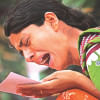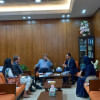Int'l Girl Child Day: More efforts required to empower girls
The International Labour Organisation and Unicef have called on Bangladesh and its development partners to accelerate their efforts to empower girls and prepare them for the 21st century.
The call came in a joint statement issued by the two UN bodies yesterday ahead of the International Day of the Girl Child 2018, which is being observed worldwide today.
The statement said that a generation of girls in Bangladesh is preparing to enter a world of work that is being transformed by innovation and automation and they need to be trained with adequate skills for employability.
It also stressed the need for ensuring the space the women need to pursue a career.
“They [girls] risk being left outside the labour force or trapped in vulnerable or low-quality informal employment, due to lack of skills and quality jobs, and expectations from their reproductive roles,” the statement further read.
It also pointed that the girls used to be at the most marginalised segments of the informal economy with fewer assets, greater risks and lower income. And those who live in the rural areas or are suffering from disabilities have even less access to decent work.
Almost 40 percent of secondary-school age children in Bangladesh are out-of-school, and vulnerable to child marriage and child labour.
According to the latest survey of Bangladesh Bureau of Statistics, some 745,690 girls aging from 5 to 17 years are engaged in child labour and 1.2 million working girls in the country are engaged in non-formal sectors.
The dropout rate among girls at the secondary education is 41.52 percent while the rate among boys is 33.43 percent.
The two UN bodies said the government of Bangladesh has developed a National Skills Development Policy in an effort to increase the rate of female enrolment in Technical and Vocational Education and Training (TVET); however, the rate is still low.
In 2016, only 25 percent of the total intake was female despite the increase in number of TVET institutes from 1,137 in 2000 to 5,897 in 2016.
Meanwhile, a group of UN rights experts in a joint statement said states around the world must take effective action to end all kinds of discriminations and gender-based violence faced by girls.
They said prompt action was needed so that girls can become full participants in all aspects of life.
UN Secretary General Antonio Guterres, in a message, also echoed the same sentiments.
“We need to equip girls with transferable and lifelong skills such as critical thinking, creativity and digital awareness. Having role models will also be critical, especially in the sciences and other fields where the presence of women is sparse,” he said.

 For all latest news, follow The Daily Star's Google News channel.
For all latest news, follow The Daily Star's Google News channel. 








Comments